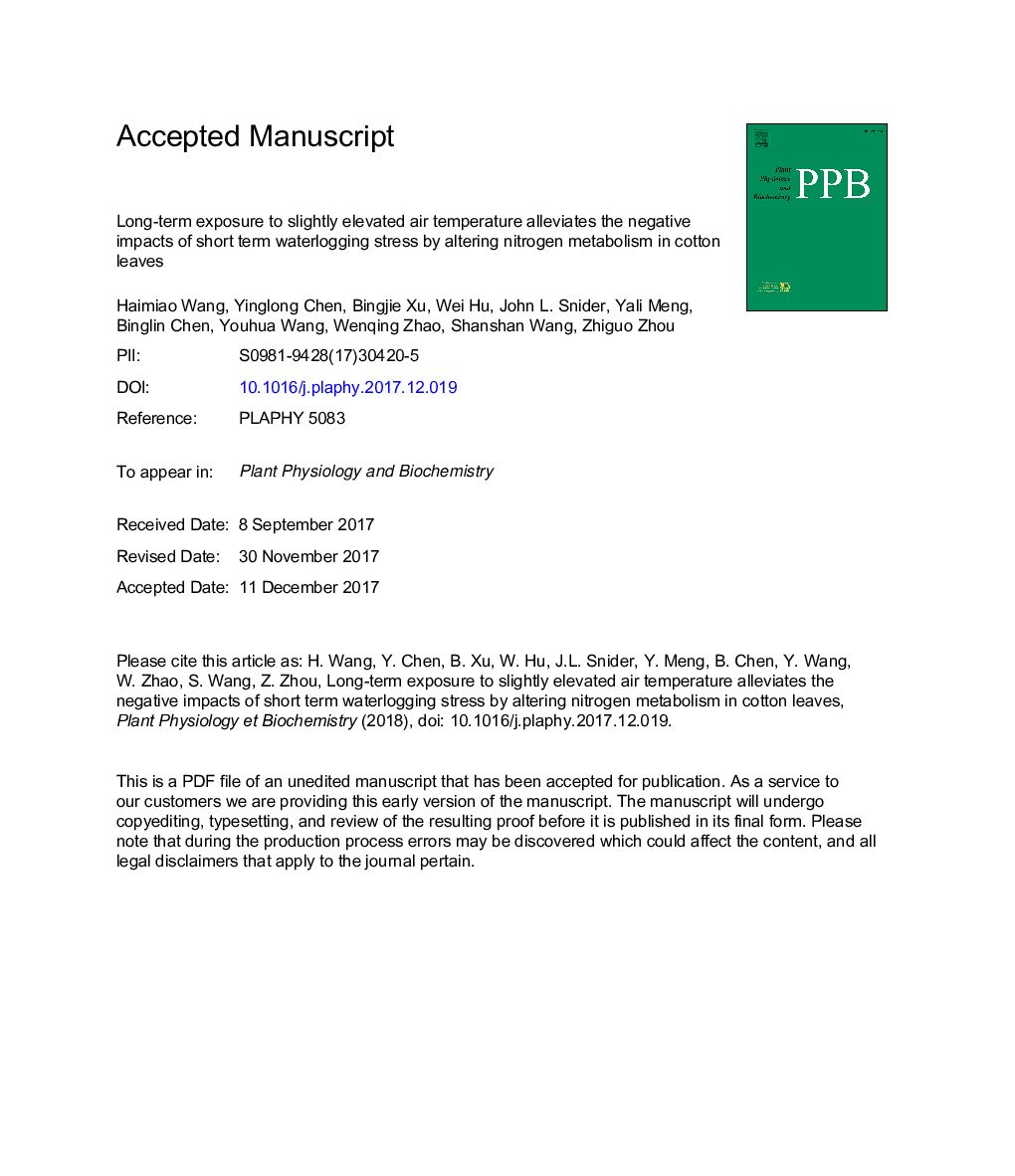| کد مقاله | کد نشریه | سال انتشار | مقاله انگلیسی | نسخه تمام متن |
|---|---|---|---|---|
| 8353481 | 1541898 | 2018 | 31 صفحه PDF | دانلود رایگان |
عنوان انگلیسی مقاله ISI
Long-term exposure to slightly elevated air temperature alleviates the negative impacts of short term waterlogging stress by altering nitrogen metabolism in cotton leaves
ترجمه فارسی عنوان
قرار گرفتن در معرض دمای طولانی مدت در دمای کم، منافع کوتاه مدت تنش آبی را با تغییر متابولیسم نیتروژن در برگ های پنبه کاهش می دهد
دانلود مقاله + سفارش ترجمه
دانلود مقاله ISI انگلیسی
رایگان برای ایرانیان
کلمات کلیدی
DPAMDTGOGATElevated temperature - درجه حرارت بالاDays post anthesis - روز بعدPlant biomass - زیست توده گیاهیWaterlogging - غرق شدنNitrogen metabolism - متابولیسم نیتروژنnitrate reductase - نیترات ردوکتازCotton (Gossypium hirsutum L.) - پنبه (Gossypium hirsutum L.)glutamate synthase - گلوتامات سنتازGlutamine synthetase - گلوتامین سنتتاز
موضوعات مرتبط
علوم زیستی و بیوفناوری
علوم کشاورزی و بیولوژیک
دانش گیاه شناسی
چکیده انگلیسی
Short-term waterlogging and chronic elevated temperature occur frequently in the Yangtze River Valley, yet the effects of these co-occurring environments on nitrogen metabolism of the subtending leaf (a major source leaf for boll development) have received little attention. In this study, plants were exposed to two temperature regimes (31.6/26.5â¯Â°C and 34.1/29.0â¯Â°C) and waterlogging events (0â¯d, 3â¯d, 6â¯d) during flowering and boll development. The results showed that the effects of waterlogging stress and elevated temperature in isolation on nitrogen metabolism were quite different. Waterlogging stress not only limited NR (EC 1.6.6.1) and GS (EC 6.3.1.2) activities through the down-regulation of GhNR and GhGS expression for amino acid synthesis, but also promoted protein degradation by enhanced protease activity and peptidase activity, leading to lower organ and total biomass (reduced by 12.01%-27.63%), whereas elevated temperature inhibited protein degradation by limited protease activity and peptidase activity, promoting plant biomass accumulation. Furthermore, 2-3â¯Â°C chronic elevated temperature alleviated the negative impacts of a brief (3â¯d) waterlogging stress on cotton leaves, with the expression of GhNiR up-regulated, the activities of NR, GS and GOGAT (EC 1.4.7.1) increased and the activities of protease and peptidase decreased, leading to higher protein concentration and enhanced leaf biomass for EW3 relative to AW3. The results of the study suggested that exposure to slightly elevated air temperature improves the cotton plants' ability to recover from short-term (3â¯d) waterlogging stress by sustaining processes associated with nitrogen assimilation.
ناشر
Database: Elsevier - ScienceDirect (ساینس دایرکت)
Journal: Plant Physiology and Biochemistry - Volume 123, February 2018, Pages 242-251
Journal: Plant Physiology and Biochemistry - Volume 123, February 2018, Pages 242-251
نویسندگان
Haimiao Wang, Yinglong Chen, Bingjie Xu, Wei Hu, John L. Snider, Yali Meng, Binglin Chen, Youhua Wang, Wenqing Zhao, Shanshan Wang, Zhiguo Zhou,
